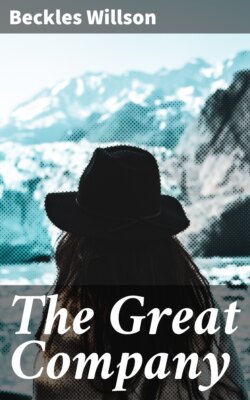Читать книгу The Great Company - Beckles Willson - Страница 10
На сайте Литреса книга снята с продажи.
ОглавлениеThe Original Charter of The Great Company.
(From a Photograph.)
Groseilliers' presence of mind.
Chouart des Groseilliers in all his transactions with the natives exhibited great hardihood of speech and action; and few indeed were the occasions which caught him unawares. It happened more than once, for instance, that some of the wandering Algonquins or Hurons recognized in this smooth-tongued leader of the English fort the same French trader they had known at Montreal, and the French posts on the western lakes, and marvelled much that he who had then been loudly crying "up King Lewis and the Fleur-de-lis," should now be found surrounded by pale-faces of a different speech, known to be the allies of the terrible Iroquois. Groseilliers met their exclamations with a smile; he represented himself as profoundly dissatisfied with the manner in which the French traders treated his friends the Indians, causing them to travel so far and brave such perils to bring their furs, and giving them so little in return. "Tell all your friends to come hither," he cried, "and King Charles will give you double what King Lewis gives."
In August, 1669, a gun was heard by Groseilliers and his English and native companions. With great joy the bushranger ran from the fort to the point of land commanding the Bay, thinking to welcome back Gillam and the expected Nonsuch. But as the vessel came nearer he saw it was not the Nonsuch, and for a moment he was dismayed, uncertain whether or not to make himself known. But the colour of the flag she carried reassured him; he caused a fire to be made, that the attention of those on board might be attracted by the smoke; and was soon made aware that his signal had been seen. The sloop headed up Rupert's River, and a boat containing three men was lowered from her side. Greater still was Groseilliers' joy when he recognized amongst the approaching party in the boat his brother-in-law, Pierre Radisson. These two sturdy children of the wilderness embraced one another with great affection and set to work diligently to barter. The Nonsuch arrived safely in the Thames in the month of August.
Satisfaction of the Adventurers.
It would be difficult to exaggerate the satisfaction of the company of London merchants at hearing the results of their first venture. They had taken counsel together, and considering the importance of securing a charter of monopoly from the King to be paramount, Prince Rupert was persuaded to use his good offices to this end.
Charles was doubtless relieved to hear that his cousin Rupert desired no greater favour. He expressed himself ready to grant such a patent, provided the Lord Chancellor approved. A charter was accordingly drawn up forthwith at the instance of the Prince, in the usual form of such charters; but the winter of 1669–70 elapsed without its having received the royal assent. Indeed it was not until the second day of May that Prince Rupert, presenting himself at Whitehall, received from the King's own hands one of the most celebrated instruments which ever passed from monarch to subject, and which, though almost incessantly in dispute, was perpetuated in full force throughout two centuries.[11]
The Charter.
This document was granted to Prince Rupert and seventeen nobles and gentlemen, comprising the Duke of Albemarle,[12] Earls Craven and Arlington, Lord Ashley,[13] Sir John Robinson, Sir Robert Vyner, Sir Peter Colleton, Sir Edward Hungerford, Sir Paul Neele, Sir John Griffith, Sir Philip Carteret, Knights and Baronets; James Hays, John Kirke, Francis Wellington, William Prettyman, John Fenn, Esquires, and John Portman, "Citizen and Goldsmith," incorporated into a company, with the exclusive right to establish settlements and carry on trade at Hudson's Bay. The charter recites that those adventurers having, at their own great cost, undertaken an expedition to Hudson's Bay in order to discover a new passage into the South Sea, and to find a trade for furs, minerals and other commodities, and having made such discoveries as encouraged them to proceed in their design, his Majesty granted to them and their heirs, under the name of "The Governor and Company of Merchants-Adventurers trading into Hudson's Bay," the power of holding and alienating lands, and the sole right of trade in Hudson's Strait, and with the territories upon the coasts of the same.
They were authorized to get out ships of war, to erect forts, make reprisals, and send home all English subjects entering the Bay without their license, and to declare war and make peace with any prince or people not Christian.
The territory described as Rupert's Land consisted of the whole region whose waters flowed into Hudson's Bay. It was a vast tract—perhaps as vast as Europe—how much vaster was yet to be made known, for the breadth of the Continent of North America had not yet been even approximately ascertained. For all the Adventurers knew the Pacific Ocean was not distant more than one hundred miles west of the Bay.
In the same merry month of May the Prince Rupert set sail from Gravesend, conveying a new cargo, a new crew, and a newly appointed overseer of trade, to the Company's distant dominions.
